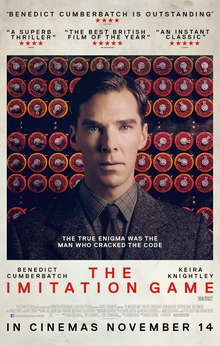| The Imitation Game | |
|---|---|
 Theatrical release poster | |
| Directed by | Morten Tyldum |
| Written by | Graham Moore |
| Based on | Alan Turing: The Enigma by Andrew Hodges |
| Produced by | |
| Starring | |
| Cinematography | Óscar Faura |
| Edited by | William Goldenberg |
| Music by | Alexandre Desplat |
Production companies |
|
| Distributed by | The Weinstein Company |
Release dates |
|
Running time | 115 minutes[1] |
| Country | United States[2][3] |
| Language | English |
| Budget | $14 million[4] |
| Box office | $233.6 million[5] |
The Imitation Game is a 2014 American period biographical thriller film directed by Morten Tyldum and written by Graham Moore, based on the 1983 biography Alan Turing: The Enigma by Andrew Hodges.
The film's title quotes the name of the game cryptanalyst Alan Turing proposed for answering the question "Can machines think?", in his 1950 seminal paper "Computing Machinery and Intelligence". The film stars Benedict Cumberbatch as Turing, who decrypted German intelligence messages for the British government during World War II. Keira Knightley, Matthew Goode, Rory Kinnear, Charles Dance, and Mark Strong appear in supporting roles.
The Imitation Game was released theatrically in the United States on November 14, 2014. The film grossed over $233 million worldwide on a $14 million production budget, making it the highest-grossing independent film of 2014. The film received critical acclaim but faced significant criticism for its historical inaccuracies, including depicting several events that had never taken place in real life.[6][7] It received eight nominations at the 87th Academy Awards (including Best Picture), winning for Best Adapted Screenplay; five nominations at the 72nd Golden Globe Awards; and three nominations at the 21st Screen Actors Guild Awards. It also received nine BAFTA nominations and won the People's Choice Award at the 39th Toronto International Film Festival.
- ^ "The Imitation Game". British Board of Film Classification. September 15, 2014. Retrieved November 6, 2014.
- ^ "The Imitation Game (2014)". BFI. Archived from the original on April 2, 2015.
- ^ "Detail view of Movies Page". afi.com.
- ^ "The Weinstein Co. Special: How They Turned 'Imitation Game' Director Into an Oscar Contender". The Hollywood Reporter. January 8, 2015.
- ^ "The Imitation Game". Box Office Mojo. IMDb. Retrieved June 20, 2021.
- ^ Anderson, L. V. (December 3, 2014). "How Accurate Is The Imitation Game?". Slate. ISSN 1091-2339. Retrieved May 8, 2024.
The Imitation Game takes major liberties with its source material, injecting conflict where none existed, inventing entirely fictional characters, rearranging the chronology of events, and misrepresenting the very nature of Turing's work at Bletchley Park
- ^ Tunzelmann, Alex von (November 20, 2014). "The Imitation Game: inventing a new slander to insult Alan Turing". The Guardian. ISSN 0261-3077. Retrieved May 8, 2024.
Historically, The Imitation Game is as much of a garbled mess as a heap of unbroken code. For its appalling suggestion that Alan Turing might have covered up for a Soviet spy, it must be sent straight to the bottom of the class.